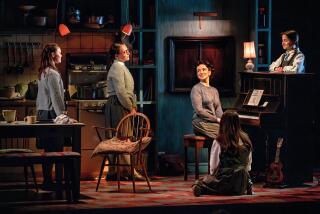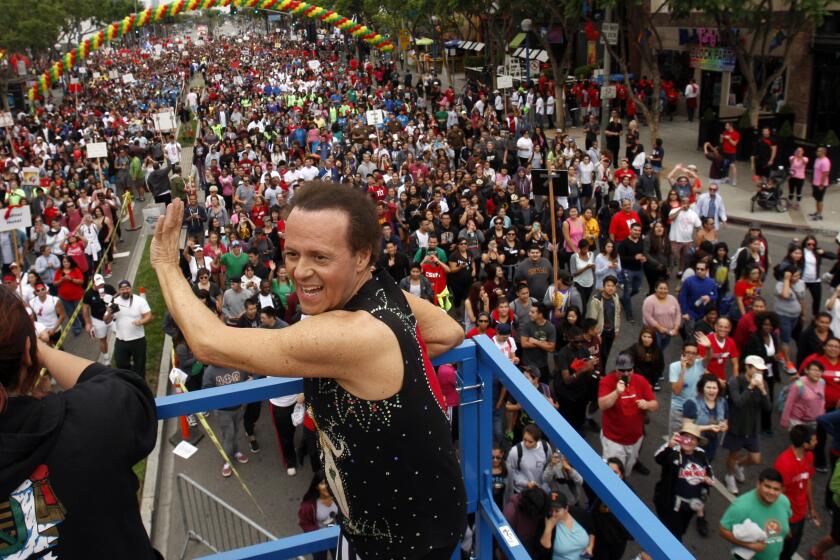Column: David Mamet just tested a new play in L.A. Why you didn’t hear about it
You might be surprised to learn that David Mamet recently tested a new play he wrote and directed at the Odyssey Theatre with a mouthwatering cast that included his wife, Rebecca Pidgeon, Emmy winner William H. Macy and stage veteran Fionnula Flanagan, who was nominated for a Tony Award last year for her performance in “The Ferryman.”
I was surprised to find out about “The Christopher Boy’s Communion,” which ended its two-week run in a hush on Sunday. Word about the production came to me not through the show’s publicist, who normally isn’t shy about sending me information, but through that harder-to-control pathway of rumor.
I got the skinny a few weeks ago at a dinner party attended by some prominent members of the L.A. theater community. The friend seated next to me, an arts patron with adventurous taste, said she would arrange tickets. Usually, I’m the one extending theater invitations, but I was glad to be the plus-one for a show in which my professional presence wasn’t being actively courted.
It’s odd for an artist as high-profile as Mamet to be trying out a new work in this independent fashion. He could have called any artistic director in town and arranged a reading or a workshop or even a public viewing.
Perhaps, after having been burned in recent years on prominent stages, he thought it best to opt for a discreet trial run. “Bitter Wheat,” the play he opened last year in London, occasioned the Vanity Fair headline: “David Mamet’s Harvey Weinstein Play Signifies Nothing.” (And that was the good news.) There are no better notes for a playwright and director than the reactions of a paying audience. There’s also nothing more stifling than critical condemnation.
I’m going to respect the tacit wishes of Mamet and not review the play as I would if it had had an official press opening. A work that’s still being tinkered with before it’s shipped to New York deserves the chance to evolve in peace even if it’s charging $50 a ticket to L.A. theatergoers. But the experience reminded me of what I admire about Mamet’s talent — the vigor and cunning of voices in all-out attack — and what I have found so off-putting since “Oleanna” — the stacking of the deck in ideological blood battles.
“The Christopher Boy’s Communion,” the latest offering of a genius who is also a bit of a crank, both fascinated and repelled me. But the play’s dark Faustian allure is too provocative to dismiss even if the rancorous treatment of religious conflict between Christians and Jews devolves into ludicrous caricature. The feedback that follows is offered in the spirit of collegiality from a critic who would like to see Mamet tighten the screws of a work that doesn’t deserve to go out into the world unhinged.
Those who remember the broadside I published in these pages seven years ago titled “The Problem With David Mamet” might wonder why I’d go out of my way to check out the still-germinating effort of a dramatist whose anti-PC animus, I’ve said, has warped his pugnacious imagination and whose clipped verbal style, I’ve further contended (adding insult to injury), has hardened into shtick. Haven’t I complained that Center Theatre Group under Michael Ritchie’s leadership has given us too much middling Mamet and too little of the new generation of American dramatists who are following in his early footsteps by reinventing the way plays sound?
Dismissing the hobgoblin of consistency, I drove to the Odyssey on Saturday afternoon with a feeling of genuine excitement. These are politically and culturally strange times, and as a theater critic ensconced in the coastal progressive echo chamber, I thought it might be useful to hear what’s on Mamet’s mind these days.
Not that I expected political topicality from a playwright more drawn to fundamental divisions. But the zeitgeist has a way of coming through Mamet’s unique lens, as it does in the opening scene of “The Christopher Boy’s Communion.”
Two New York City police officers are speaking candidly about their latest horrific case while knocking back glass after glass of whiskey. An honor student at an elite Catholic school brutally raped and murdered a young female neighbor in Central Park. The savagery of the attack, which led to the suicide of another police officer traumatized by the crime, has shocked these detectives, who have seen too much to be shocked easily.
Hollis (Macy) is sure the killer’s rich parents are going to do everything in their power to get their son out of jail. While bemoaning the banning of nightsticks on the force and the confusion of parental discipline with physical abuse by crafty defense lawyers, he fills in Burke (Dominic Hoffman) on his cynical theory of how the trial will play out.
Mamet has created in Hollis a representative of the aggrieved American male. A walking Breitbart comments section, he recognizes that “law and order” is just a “fear of consequences,” but his disgust is inflamed by the same nostalgic righteousness that has Trump supporters baying for blood at campaign rallies.
What pricked up my ears wasn’t so much Hollis’ truculent sentiments as his acidulous language, which Macy delivered like a blue-collar maestro. The writing has flashes of concentrated strength that confirm that this is indeed the same Mamet who changed the American theater with “American Buffalo” and “Glengarry Glen Ross.”
“The Christopher Boy’s Communion” is not Hollis’ play, though the extended opening scene sets up both the story and the philosophical stakes. Mamet is less interested in a crime that bears a vague resemblance to the so-called “Preppy Killer” case that dominated the New York tabloids in the mid-1980s than in the manipulative evil it provokes. Where the drama goes astray is in the heavy-handed religious baggage that’s piled on. A melange of Roman Polanski’s “Rosemary’s Baby,” Christopher Marlowe’s “The Jew of Malta” and Conor McPherson’s “The Seafarer,” the work itself seems at times demonically possessed.
The protagonist is Joan (Pidgeon’s character), a devout Catholic and proud anti-Semite willing to stoop to anything to free her son, who, it turns out, mutilated the body of a nice Jewish girl he was apparently involved with. In a series of tense encounters, Joan tempts her husband, Alan (Clark Gregg), a Jewish lawyer named Mr. Stone (David Paymer) and Father Paul (John Pirruccello) to do her diabolical bidding.
The play pits this modern-day, churchgoing Lady Macbeth against what she crazily considers the forces of “miscegenation.” Her lack of satisfaction leads her to the office of the eerie Mrs. Charles (a marvelously brusque Flanagan), where a failed Mephistopheles nimbly negotiates to become a Faust.
The staging of “The Christopher Boy’s Communion” has a peculiar silence for a play that is nothing but talk. Characters listen as though their lives depend on what they might hear. If the dialogue is more tantalizing than convincing, the problem stems from Mamet’s prioritizing of cadence over character.
Few are as adept at delivering the pitch and rhythm of a Mamet script as Pidgeon, but Joan is impossible to place. Her milieu is supposedly Catholic New York, but the world she evokes is one of malevolent melodrama. The play presses her to baleful, almost medieval, extremes that would be infinitely scarier if more specificity and subtlety were permitted.
No one is asking for realism, only more fleshed-out theatrical reality. As with the vast majority of Mamet’s late works, the action seems to emanate from distortions in his imagination rather than from the minds of his characters. Plausibility, or the art of making the impossible seem natural, requires more scrupulous attention to behavioral detail.
But some of the old black magic is present in “The Christopher Boy’s Communion.” In their silences as well as in their speech, the actors endowed their roles with granularity while respecting Mamet’s clean style. But the play, a reworking of an old myth about the bartering of a soul, is still a draft or two away from realizing its sinister promise.
More to Read
The biggest entertainment stories
Get our big stories about Hollywood, film, television, music, arts, culture and more right in your inbox as soon as they publish.
You may occasionally receive promotional content from the Los Angeles Times.











